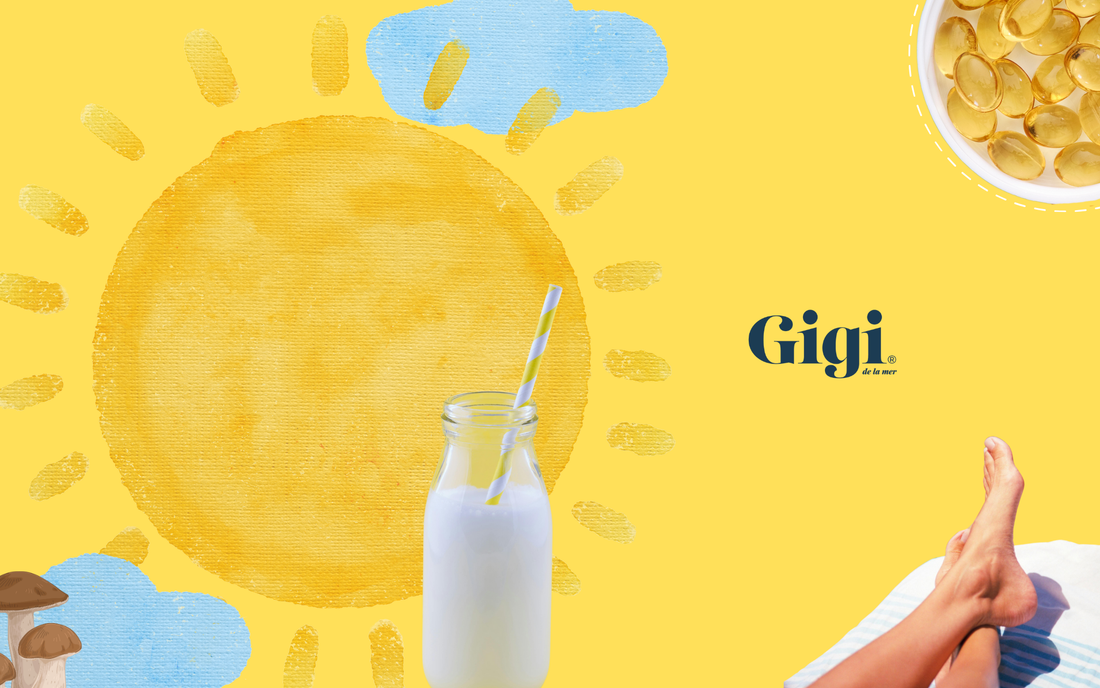As we move into October, the evenings get darker, the days get shorter and the sunshine feels like a distant memory. That’s why now more than ever, Vitamin D deserves a place in your daily routine. Often called the sunshine vitamin, it’s made in our skin when we’re exposed to sunlight.
The challenge is that from October to March in Ireland, the sun just isn’t strong enough to give us what we need – and even the healthiest, most balanced diet is unlikely to cover the gap.
So, let’s break down what Vitamin D actually is, what it does in your body, and why it’s especially important for women’s health!
What is Vitamin D?
Vitamin D is a micronutrient with a lot of important jobs in the body. It’s a fat-soluble vitamin, which means it’s absorbed alongside dietary fat and stored in your body and liver for later use.
Interestingly, Vitamin D is actually a pro-hormone, meaning it acts more like a hormone than a typical vitamin. And here’s the really unique part – it’s the only nutrient where your main source doesn’t come from food. Instead, your body makes it when your skin is exposed to sunlight (specifically UVB rays).
You can still get some Vitamin D from food, but the list is fairly short. And even then, it’s hard to meet your daily needs through diet alone. There are two main types:
-
D2 – comes from plant-based sources
-
D3 – comes from animal sources and is also the form produced by sunlight|
Food sources of Vitamin D include:
-
Oily fish: salmon, sardines, herring, mackerel
-
Red meat & Liver
-
Egg yolks
-
Mushrooms (grown under UV light)
-
Fortified foods: some spreads and breakfast cereals
Even with these foods in your diet, it’s tough to get enough Vitamin D from food alone – especially Ireland’s autumn and winter months.
What Does Vitamin D do in the Body?
Bone Health & Calcium Absorption 🦴
Vitamin D helps your body absorb calcium efficiently. Without it, even a calcium-rich diet can’t do its job, which means weaker bones and teeth.
Immune Support 🛡️
It plays a key role in regulating the immune system, helping your body fight off infections and keeping inflammation in check. That’s why Vitamin D is often linked to fewer colds and stronger defences during the winter months.
Muscle Function 💪
Vitamin D supports healthy muscle performance, helping to reduce weakness and improve strength. Adequate levels are especially important as we get older, as they can help reduce the risk of falls.
Mood & Mental Wellbeing ☀️
Vitamin D isn’t just about bones and muscles – it also plays a role in keeping your brain happy. Emerging research links low vitamin D levels to a higher risk of low mood, anxiety and even cognitive decline. It helps produce serotonin, reduces neuroinflammation and supports brain plasticity — all key to keeping your mind happy and resilient.
Why Vitamin D is Especially Important for Women?
Osteoporosis 🦴
Women are naturally more prone to bone density loss as they age, which makes vitamin D essential throughout life. It’s key for building peak bone density in your 20s and 30s, laying a strong foundation for later years. Adequate vitamin D also helps your body absorb calcium efficiently, supporting strong bones now, maintaining bone strength as you age and reducing the risk of osteoporosis – a small daily habit that pays off big in the long run.
PMS 🌸
Research shows that women with higher vitamin D (and calcium) intake have a lower risk of developing PMS compared to those with lower levels. Keeping your vitamin D topped up may help ease those monthly symptoms – a small but noticeable boost to your wellbeing.
PCOS ⚖️
Vitamin D deficiency is common in women with PCOS, and research suggests that low levels may actually worsen symptoms. One meta-analysis found that vitamin D intake was linked to improved insulin sensitivity, lower testosterone levels, and even reduced cholesterol. In short, keeping your vitamin D levels topped up may help support hormonal balance and metabolic health in women with PCOS.
Pregnancy & Baby’s Development 🤰
During pregnancy, vitamin D is crucial for both mom and baby. It supports healthy bone formation in the growing baby and helps maintain maternal immune health. Adequate levels may also reduce the risk of complications, making it a key nutrient throughout pregnancy.
Skin Health ✨
Vitamin D supports skin cell renewal and repair, tissue healing and hair follicle function. Low levels can make conditions like eczema, psoriasis and acne worse, and may even contribute to hair loss. Keeping your levels topped up is a small step that makes a big impact on your glow.
How to Get Enough Vitamin D in Ireland 🌤️
There are three main ways to get Vitamin D – here’s the breakdown:
1. Sunshine (when you can!) ☀️
Even a few minutes of sunlight on your face, arms or hands can help your body make Vitamin D. But in Irish winters, the sun just isn’t strong enough, so supplementation is key from October to March.
Those most at risk of deficiency include:
-
People who aren’t often outdoors, such as the frail or housebound
-
Those who wear clothing that covers most of their skin when outside
-
People with darker skin, who may produce less vitamin D from sunlight
2. Food sources 🍳
Vitamin D is found in a few foods, though it’s hard to meet your needs from diet alone. Include:
-
Oily fish (salmon, sardines, mackerel)
-
Egg yolks
-
Mushrooms
-
Fortified foods like some spreads and breakfast cereals
3. Supplements 💊
For most adults in Ireland, a vitamin D supplement is the easiest way to maintain adequate levels in autumn and winter. Vitamin D3 is usually the most effective form and there are vegan options too. Why Choose Vitamin D3? 🌞
Vitamin D3 is the most bioavailable and effective form. Here’s why:
-
Better absorption: Your body absorbs and uses D3 more efficiently than D2.
-
More effective long-term: D3 is better at raising and maintaining overall vitamin D levels.
-
Year-round support for PCOS: Taking a D3 supplement all year round may be especially beneficial if you have PCOS.
💡 Gigi Tip: For even better absorption, take your supplement with a meal that contains healthy fats (think avocado, nuts, seeds or olive oil) since vitamin D is fat-soluble.
This autumn, don’t let the Irish winter dull your glow. A little Vitamin D goes a long way for your bones, muscles, mood, skin and overall wellbeing. Whether through sunlight, diet or supplements, making sure your levels are topped up is a small habit with a big payoff – and one your future self will thank you for!



